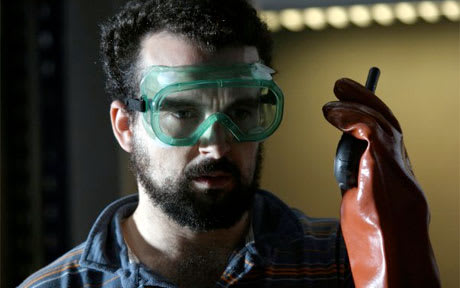Timecrimes is released under Magnet Releasing's Six Shooter Film Series, a group of international, genre-bending films that also begat Let the Right One In. Unfortunately, Nacho Vigalondo's time travel sci-fi noir (à la Memento or Primer) exists solely as an exercise in style, without a shred of character, story, intrigue or deeper philosophical meaning. To Vigalondo's credit, he's done his time paradox due diligence, as his time travel scenario and step-by-step events and movements of his characters are clearly thought-out. Héctor (Karra Elejalde), a portly middle-age man, lives alone in the Spanish country with his wife Clara (Candela Fernández). One day, while sitting on his lawn chair inexplicably looking out into the bare woods with his binoculars, he sees a suspicious woman stripping off her clothes. He's intrigued enough to investigate and finds her lying unconscious on the ground, victim of some kind of attack. Suddenly Héctor is attacked from behind, causing him to run off in the opposite direction and onto the property of a scientific laboratory. While evading the attackers, he's helped by a humble scientist who tells him to hide in his futuristic experimental contraption, which happens to be a time machine, whisking Héctor back to the previous day. And thus begins the journey of Héctor number two through the same events as Héctor number one. Each time Héctor goes through the device he becomes more aware of the time paradoxes and problems associated with manipulating time. Unfortunately the systematic plotting only serves to reveal Vigalondo's gung-ho attempts to be clever. If there was a character we cared about, with stakes sufficiently raised, we could glaze over the illogical contrivances of the action. In Memento, we were provided with a solid external anchor and goal for our hero: the search for the killer of Leonard's wife. In Timecrimes, there is no anchor — everything Héctor does is meant to fit into Nacho's artificial scenario. With little real world common sense, and very little to reveal in emotion or character, it all makes for the cinematic equivalent of a make-work project: digging a hole and filling it in
(Mongrel Media)Timecrimes
Nacho Vigalondo

BY Alan BacchusPublished Apr 2, 2009